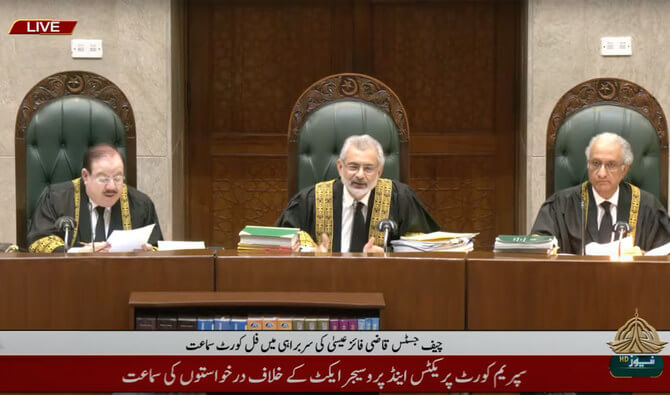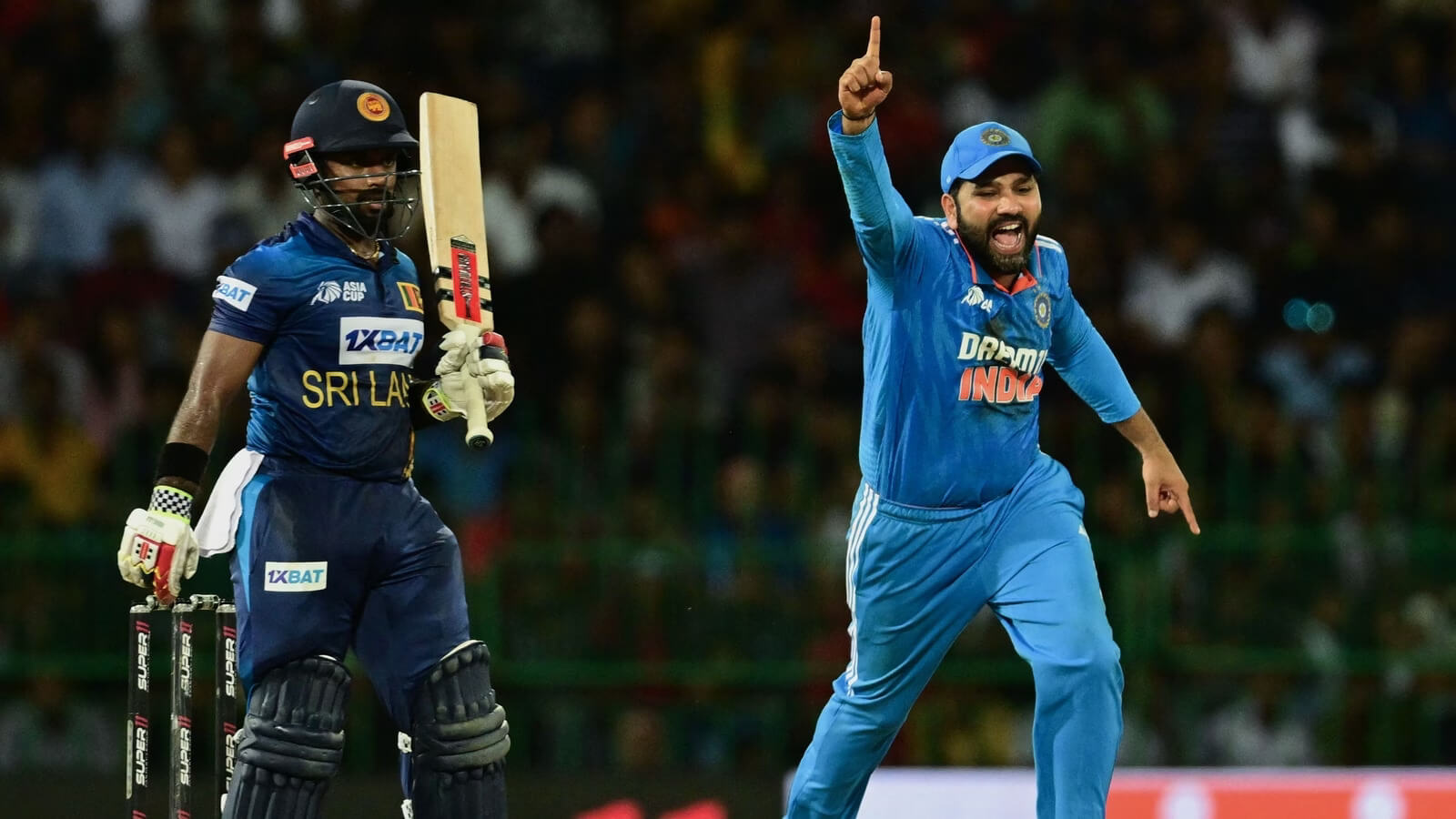Pakistan’s Supreme Court Breaks New Ground
In a groundbreaking move that’s causing waves in Pakistan’s legal scene, the Supreme Court of Pakistan has opened its doors like never before. For the first time in the country’s history, the Pakistan’s Supreme Court live-streamed on national television. This isn’t just a leap forward; it’s a giant leap toward more transparency and accessibility in Pakistan’s justice system.
Leading this transformation is Chief Justice of Pakistan (CJP) Qazi Faez Isa, who, right on his first day in office, assembled a full-court lineup – all 15 judges of the Supreme Court. Their mission: to tackle a set of petitions challenging the rather controversial Supreme Court (Practice and Procedure) Act 2023. This law gets into the nitty-gritty of the Chief Justice’s suo motu powers and it’s stirring quite a legal tempest. And here’s the kicker – these hearings were live-streamed on PTV, Pakistan’s national television, giving everyone a front-row seat to a groundbreaking moment.
The Path to Transparency
Pulling off live-streamed proceedings in Pakistan’s Supreme Court wasn’t a walk in the park. It involved meticulous planning, discussions, and an unwavering commitment to justice and fairness. The decision to go live was made during a full-court meeting, where they crafted guidelines for these live sessions. Importantly, these guidelines were rolled out just hours after Chief Justice Qazi Faez Isa took the oath of office. Talk about hitting the ground running!
To make this happen, they installed five cameras strategically. Four cameras were set up in the visitors’ gallery, so people watching from home could get the full picture. And one camera was positioned right in front of the lawyers’ rostrum, offering a closer look at all the legal battles and courtroom drama. The setup was like an orchestra, harmoniously capturing every detail of the courtroom, making you feel like you’re right there in the midst of it all.
The Full-Court Drama: Unity and Purpose
At the heart of this whole saga was the full-court formation – all 15 Supreme Court judges coming together. Chief Justice Qazi Faez Isa brought in the collective wisdom of his fellow judges to tackle these petitions against the Supreme Court (Practice and Procedure) Act 2023.
The significance of this full-court isn’t something you can downplay. It screams, “This is important!” It shows just how crucial and complex this case is. By pulling in the entire team, CJP Isa signaled that they were all in this together, leaving no stone unturned. It’s like when you’re working on a tough group project in school – you know it’s going to be a doozy, so you assemble the dream team.
The Debate-Worthy Act: Putting Procedure Under the Microscope
At the heart of this drama is the Supreme Court (Practice and Procedure) Act 2023. This act isn’t just controversial; it’s a hot potato of legal debates in Pakistan. It messes with the powers of the Chief Justice, especially when it comes to those suo motu cases. Under this act, the authority to take suo motu notices and form apex court benches for constitutional matters of public importance is given to a committee of three senior judges, including the Chief Justice. But before this, it was all in the Chief Justice’s hands.
The bill went through the National Assembly and Senate in March 2023 and was sent to President Dr. Arif Alvi for a thumbs-up. But Alvi wasn’t buying it, so he sent it back to the parliament for a rethink. After a joint session of parliament gave the bill a nod for the second time, it was all set to become law, but then the Supreme Court stepped in and said, “Hold on, not so fast!”
The High-Stakes Debate
As these live proceedings unfolded, legal eagles, scholars, and the public tuned in to catch all the action. The government, with Attorney General for Pakistan Mansoor Usman Awan as their voice, pleaded with the Supreme Court to toss out those petitions opposing the law. They argued that such petitions, which take on acts of Parliament, just aren’t admissible.
And then there were the legal experts, scholars, and advocates who brought their A-game to the debate. They dug into all the angles – what this law meant for judicial independence, the right to appeal in suo motu cases, and the role of Parliament in judicial affairs. These conversations peeled back the layers on the complexity of the case.
A Peek Behind the Legal Curtain
The decision to live-stream these proceedings is like a shout from the Supreme Court’s rooftop, saying, “We’re open for business!” It’s about transparency, accountability, and making sure the public is in the loop. Anyone who wanted to see the justice system at work could do so in real-time. This initiative helps demystify what happens behind closed doors, making the justice system more accessible to everyone.
By letting cameras into the Supreme Court, Chief Justice Qazi Faez Isa and his team sent a clear message – justice isn’t something that happens behind closed doors. It’s a public trust, and they’re all about keeping that trust alive and kicking.
The Chief Justice’s Call for Openness
As these live proceedings kicked off, Chief Justice Qazi Faez Isa had a message for the Supreme Court staff. He said, “Treat visitors like guests.” It’s a fancy way of saying, “Be nice to people who come here.” He knows that when people show up at the Supreme Court, it’s not because they’re having a grand old time. They’re there to get answers to their problems. He also called for the doors of justice to stay wide open, just like the local coffee shop that never closes.
On his first day in office, the Chief Justice said, “No, thanks” to a guard of honor. He knew that when people come to the Supreme Court, it’s not because they’re throwing a party. They’re there because they’ve got some heavy stuff on their minds. The Chief Justice gets it – he knows what’s up.
The Impact and What Lies Ahead
The live-streaming of these Supreme Court proceedings in Pakistan is a game-changer. It’s not just a local thing; it’s making waves globally. It’s all about justice, transparency, and accountability. As these historic proceedings roll on, the legal folks, scholars, and the rest of us are all ears, waiting to see what the Supreme Court decides. We know it’s going to be a big deal for Pakistan’s legal system.
This isn’t just a one-and-done kind of thing. It’s like a pebble that causes ripples in a pond. This move is sparking discussions about legal reforms, judicial independence, and how the government’s powers stack up against the judiciary in Pakistan. It’s making folks more interested in law and how it all works.
Judge Frank Caprio: A Glimpse from Across the Globe
Speaking of live justice, let’s take a quick detour to Providence, Rhode Island, where Judge Frank Caprio has been dishing out his own brand of real-life courtroom drama. Judge Caprio, known for his compassionate approach to justice, has become a sensation on social media. He’s been presiding over real cases with real people, and the world can’t get enough of it. While the Pakistan Supreme Court is pioneering live-streaming of legal proceedings, Judge Caprio has taken justice to the masses through platforms like YouTube.
Just like Pakistan’s Supreme Court is breaking barriers, Judge Caprio’s heartwarming moments and unique style of justice have captured the hearts of millions. It’s a reminder that the law isn’t just about rules and regulations; it’s about people and their stories.
A New Dawn: Pakistan’s Supreme Court Paves the Way for Open Justice
Live-streaming Supreme Court proceedings in Pakistan isn’t just a blip on the legal radar; it’s a game-changer. Chief Justice Qazi Faez Isa and his gang of 15 judges have kicked off a revolution in how we see justice. By opening up the Supreme Court to live broadcasts, they’ve told the world that justice isn’t something you hide behind closed doors. It’s a trust you keep with the public.
As these proceedings chug along and legal minds duke it out, Pakistan stands at a crossroads. This isn’t just about the Supreme Court; it’s about the whole legal landscape. It’s a reminder that justice isn’t just for a chosen few; it’s for everyone.
With this bold step into openness and public involvement, Pakistan’s Supreme Court live has lit a fire under legal institutions worldwide. They’ve shown that justice can be open and accessible, and that’s a path we should all be walking down.
Pakistan’s Supreme Court Live
- 49ers and Eagles Set to Clash in High-Stakes NFC Rematch - December 4, 2023
- NoFap Philosophy: A Contemporary Guide for Modern-Day Warriors - November 13, 2023
- ICC Cricket World Cup 2023: Your Ultimate Guide To The Cricket Showdown - September 29, 2023











